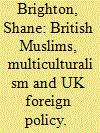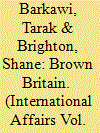|
|
|
Sort Order |
|
|
|
Items / Page
|
|
|
|
|
|
|
| Srl | Item |
| 1 |
ID:
076516


|
|
|
|
|
| Publication |
2007.
|
| Summary/Abstract |
After the 7 July and 21 July 2005 attacks on London the government-sponsored effort to `prevent extremism together' has repeatedly acknowledged the central role of anger at UK foreign policy in the radicalization of some British Muslims. This acknowledgement has been incorporated into a `comprehensive framework for action' centring upon the need for increased `integration' and an effort, critically, to re-work British multiculturalism as a means to combat terrorism. Examining the history of multiculturalism in Britain and the tradition of living and acting `together' that it suggests, however, raises a set of questions about the society into which integration is supposed to occur, what integration might involve and its real efficacy for combating terrorists. In addressing these issues, this article suggests that the debate over contemporary multiculturalism should be situated within a much wider social and political crisis over the meaning of `community' in the UK, to which questions of global order and foreign policy are central. Comparing the `ethical' basis of Al-Qaeda's attacks with Tony Blair's invocation of `values' as the foundation for military intervention reveals that both seek to realize models of community through violence and a shared process of `radicalization' which in both cases precedes 9/11 and which might be traced back to the Gulf War of 1991. The article concludes that debate over the future of multiculturalism in the UK is being conducted alongside and is implicated within a second, violent global conflict over community: one which is central to, but essentially unarticulated within the domestic context.
|
|
|
|
|
|
|
|
|
|
|
|
|
|
|
|
| 2 |
ID:
123882


|
|
|
|
|
| Publication |
2013.
|
| Summary/Abstract |
How do we approach the subject of British grand strategy today? This article seeks a new approach to this question. It argues that there is a gap of grand strategic significance between actually-existing Britain and the Britain its political elites tend to imagine.
The colonial and imperial histories that helped constitute and still shape the contemporary United Kingdom have fallen through this gap. One consequence is a grand strategic vision limited to a choice of partner in decline - Europe or the US. Overlooked are the power political potentialities of post-colonial generations situated in multiple sites at home and abroad.
In search of this potential, we lay the conceptual basis for a strategic project in which the British 'island subject' is replaced by a globally networked community of fate: 'Brown Britain'. This entails reimagining the referent object of British strategy through diaspora economies, diverse histories and pluralized systems of agency.
What might such a post-colonial strategy entail for British policy? We offer initial thoughts and reflect on the often occluded social and political theoretic content of strategic thought.
|
|
|
|
|
|
|
|
|
|
|
|
|
|
|
|
| 3 |
ID:
106193


|
|
|
|
|
| Publication |
2011.
|
| Summary/Abstract |
This paper approaches the ontology of war by asking why, despite its constitutive function for politics and society, has war never been made the object of an academic discipline? Through an analysis of the relationship between war and knowledge about war, we argue that the ontology of war is such that it disrupts foundational claims of the kind necessary for conventional forms of academic disciplinarity. At the center of the ontology of war is fighting, an idea we recover from Clausewitz. A moment of radical contingency, fighting both compromises knowledge about war and forces the unmaking and remaking of social and political orders. These generative powers of war operate through the production of systems of knowledge and their institutionalization in the academy, the state and wider society. Although of existential significance for political authority, these knowledges are vulnerable to the very contingency of war that produces them. This complex of relations between war, knowledge, and power we term War/Truth. As such, an analytical framework adequate to war requires a reflexive relation to truth claims. We clear the ground for such a "critical war studies."
|
|
|
|
|
|
|
|
|
|
|
|
|
|
|
|
| 4 |
ID:
126065


|
|
|
|
|
| Publication |
2013.
|
| Summary/Abstract |
This article extends and critiques Michel Foucault's political sociology of war by taking it beyond its modern subjects. Positioning his work alongside Homer, Heraclitus and Plato, it analyses relations between war, truth and race in the transition from Archaic to Classical Greece. In doing so, it approaches philosophical texts as direct reflections on specific historical experiences of war, making the case for a political theory of fighting as a necessary and under-developed aspect of critical war studies. Such an approach, the article concludes, opens up new scholarly possibilities for the political sociology of war and resources political intervention against war-waging powers whose authority-inside and outside the academy-derives from a supposedly authoritative relation to the history and conduct of fighting.
|
|
|
|
|
|
|
|
|
|
|
|
|
|
|
|
|
|
|
|
|